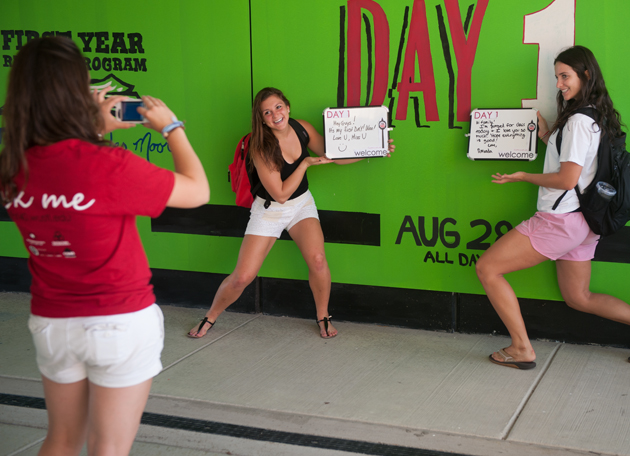
At the beginning of every fall semester, passersby might think things have gone topsy-turvy on the Wash. U. campus: Instead of students doing last-minute book-buying and attempting awkward conversation, they compete to blow feathers in the air; the St. Louis Symphony serenades a casual crowd walking back from classes; and young adults sip juice boxes before heading off to an after-hours event at the Saint Louis Science Center.
But that’s just a regular start of the school year for Washington University, where faculty, staff and students work together to make sure new students feel at home from the moment they set foot on campus.
The university’s efforts at community-building start with Bear Beginnings: New Student Fall Orientation. Events include the Ultimate Floor Challenge, which pits freshmen floors against one another in a series of silly but community-building contests (such as putting a pedometer on your wrists and trying to accrue the most steps), and the Freshmen Reading Program, where all new students read an assigned book over the summer and then discuss it with their floor members along with a faculty member. This year’s book was The Other Wes Moore: One Name, Two Fates. As a bonus, early in the semester author Wes Moore visited the Danforth Campus to give an Assembly Series lecture as part of the First 40 program.
Orientation essentially passes the baton to the First 40 program, which is a series of activities that take place over new students’ first 40 days — activities in which departments from all areas of campus collaborate. Right away, students connect with residential advisers and WUSAs (Washington University Student Associates), who are on students’ floors to help them learn about life at Washington University; meet with faculty advisers; and grab dinner with faculty associates. Some professors even live in the residence halls and host special programming for their fellow residents.
The First Year Center, Office of Residential Life and Campus Life, along with student volunteers, work together each year to pull off a series of signature events, which officially make up the First 40. The program’s holistic nature and extended duration make it stand out among the university’s peers. According to Katharine Pei, assistant director for First Year Center programs, typically only large state schools have similar programs, although often without the same depth as Washington University’s.
“Not being from St. Louis, it showed me so many things [that] were available both on and off campus. More than anything, First 40 made me feel at home at Washington University. Everyone involved was excited to greet and help us.”
—Brendan McIntyre, a sophomore & WUSA
These activities are designed to help students feel welcome at Washington University, make friends, and engage with the campus and St. Louis communities as quickly as possible.
“They’re transitioning and trying to figure out how college is different from high school, and they’re trying to adjust to the academic rigor of Wash. U. as well as have a social life,” Pei says. “The First 40 is important for us because we want them to be able to do all of those things successfully.”
“For me, not being from St. Louis or having any connections to the area, it was eye-opening in that it showed me so many things were available both on and off campus,” says Brendan McIntyre, a sophomore and WUSA. “More than anything, First 40 made me feel at home at Washington University. It was evident that everyone involved was excited to greet and help us.”
That reaction is exactly what Wash. U. administrators work so hard to cultivate and part of what makes the university special.
Creating common bonds
“The First 40 ensures that events for new students continue past orientation and throughout the semester in order to make them feel comfortable as they transition into Washington University,” says Becky Greenberg, a junior studying architecture who helped plan this year’s First 40.
“The First 40 ensures that events for new students continue past orientation and throughout the semester to make them feel comfortable as they transition into Washington University.”
—Becky Greenberg, a junior & planner of First 40 in 2012
The kickoff event for First 40 takes place on the first day of classes. Students are greeted at the Forsyth Underpass on their way to class by cheering WUSAs, Wash. U. faculty and staff, who dispense granola bars and juice boxes along with words of encouragement. Students can also get their photo taken and sent to their parents.
“For most students, it’s the first time they’re going to school without their family being there for them,” Pei says. “We try to provide a smiling face and a light snack … and a place where students can get their questions answered.”
The second major event is the Big Bang, where students pile into buses with members of their residential floors and head to the Saint Louis Science Center. There, they explore the museum, participate in a dance party, and enjoy performances by Wash. U.’s student a cappella and dance groups.
Then, there’s Saturday in the Park, during which students head over to Forest Park and explore its free museums, zoo and trails.
Only a few days later students can enjoy the sounds of the St. Louis Symphony right on the South 40, when its members put on an alfresco performance.
The First 40 experience extends beyond these early events and includes a student activities fair, which introduces students to all the clubs and groups existing at Washington University, and Service First, which pairs students with volunteer work in the St. Louis community.
Program receives high praise
All the work put into these activities pays off, according to students who have gone through the program.
“First 40 was great because for the first week or so it was kind of difficult, being in a new place, so knowing that the university had events planned out for us and that they cared made me feel more comfortable being here,” says freshman Erika Castriz, who bonded with her floor mates during the Big Bang.
“Research indicates that if new students feel as if they’ve made a significant connection to their peers, a faculty member or an organization within the first 30 days, then the likelihood they’ll have a positive experience their first year, and subsequent years, is much greater.”
—Mary Zabriskie, assistant director of campus life
Freshman Mia Perlman appreciated the myriad opportunities to learn how to succeed in college right out of the gate. “Even if I wasn’t able to attend all of them, I would get emails all the time about programs like ‘how to survive lecture classes’ and ‘how to improve study habits,’” she says.
McIntyre recalled watching the freshmen on his WUSA floor collaborate in the WUFC: The Ultimate Floor Challenge. “They had a lot of pride in their floor, and from then on they seemed to open up and embrace the community, seeing Wash. U. as their home,” he says.
Older students still hold on to fond memories of their First 40.
“The Big Bang was one of my favorite parts because it was a time where I could really hang out and bond with my freshman floor,” Greenberg says.
Even more than just having fun, the activities themselves encourage the building of trust. At this year’s symphony performance, a freshman sought out Sam Cornblath, a First Year Center executive board member, for advice. “I think it was a perfect opportunity to get to know him better and help him out with some early difficult issues,” Cornblath says.
Recognizing a need
This year, Greenberg, also a First Year Center executive board member, was student chair of the First 40 committee and in charge of programming, advertising and marketing, and running the events.
“Students have been instrumental from the very get-go,” says Jill Carnaghi, PhD, associate vice chancellor for students and dean of campus life. “It’s just become more sophisticated and well-planned as the years go by.”
The idea for a freshmen initiative started with the late Jim McLeod, who was vice chancellor for students and dean of the College of Arts & Sciences; Karen Levin Coburn, then associate vice chancellor for students and dean of the freshman transition; and Delores Kennedy, then associate dean of freshmen in Arts & Sciences, and was first enacted in 2005.
“McLeod stressed that the freshman initiative is not just a one-year effort but a beginning, and that we need to focus on the class from the time they apply to Wash. U.,” Carnaghi says.
Since its inaugural year, the First 40 has grown to be more inclusive and well known throughout the community. Its name was intended to be familiar to the student body not just because the activities took place within the first 40 days on campus but also because of the significance of the South 40.
Connection Fosters Comfort and Success
The need for an orientation program that lasts six to eight weeks has been well-documented.
“Research indicates that if new students feel as if they’ve made a significant connection to their peers, a faculty member or an organization within the first 30 days, then the likelihood they’ll have a positive experience their first year, and subsequent years, is much greater,” says Mary Zabriskie, assistant director of campus life.
Students who make these connections also are much more likely to have a positive return rate and general level of satisfaction with their experience.
Michelle Merlin, AB ’12, is a freelance writer based out of Washington, D.C., and a former editor of Student Life.
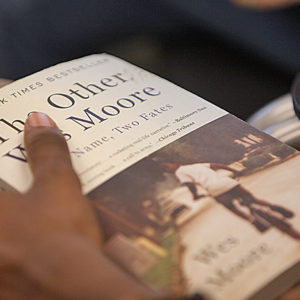
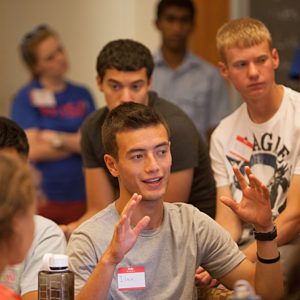
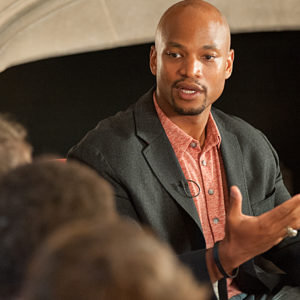
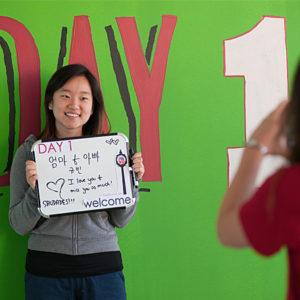
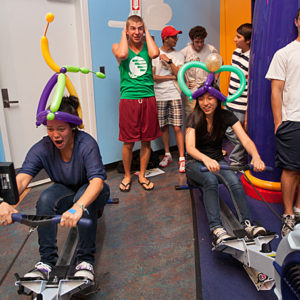
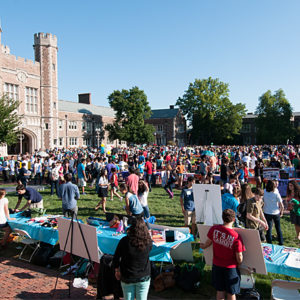
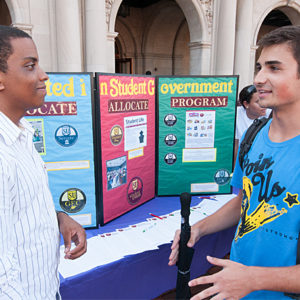
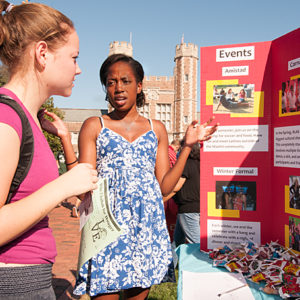
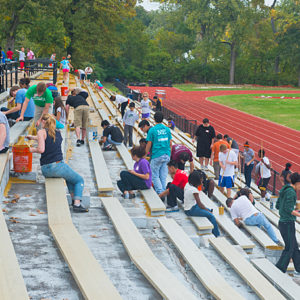
Comments and respectful dialogue are encouraged, but content will be moderated. Please, no personal attacks, obscenity or profanity, selling of commercial products, or endorsements of political candidates or positions. We reserve the right to remove any inappropriate comments. We also cannot address individual medical concerns or provide medical advice in this forum.